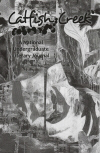Loras College, which publishes the national undergraduate literary journal Catfish Creek, sits near the banks of the Mississippi River in Dubuque, Iowa. The contributors hail from colleges across the country, but it is through Loras, which is serving as a kind of modern-day Paris in uniting these writers, that we see their work collected and their spirits compiled.
It is hard to generalize about a volume of work rich with diverse voices and styles, but categorically, the writers of this year’s volume have taken artistic risks that read exceptionally well. Take the poetry of Truman State University’s Kirk Schlueter, who published “Love Poem #2,” a prose poem, and “Allen Ginsburg’s Ghost,” which, while framed in two stanzas, manages a brisk, aerial narration. The conversational tone (albeit a smart conversationalist) makes the surrealism entirely fresh. The ideas in each poem are like pop art—candy-colored and funny and indispensible.
The writers of nonfiction also invert the expected and take stylistic risks. Shane McGowan’s “Braid in Blues” and Keely Lewis’s “Taste and See that It Is Good” organize facts and ideas in segments. McGowan explores the legacy of Bob Dylan ephemerally—you can hear Dylan’s music in the language McGowan uses to evoke tribute and craft homage. Lewis’s essay, in a near parallel structure to McGowan’s, addresses generous, liturgical ideas in the context of faith and family. The third nonfiction piece, Ashley Bowcott’s “The Weight of it All,” is more straightforward. Bowcott documents a dysfunctional workplace where one of the cooks abuses his rank (both inside the restaurant and outside) to humiliate and abuse women. Her anger, and the way she reasons through it, is tough and sinewy. She may be young, as is material to the piece, but her thoughts are as clear as mirrors.
Rebecca Shepard displays a powerful mastery of language in her story that borrows Hemingway’s writing for her title, “For Sale: baby shoes, never worn.” She has a mastery of abstract imagery and ideas that nonetheless read well. Readers seek emotion and transitions, but these elements are hard to pin together so nicely as she does in three words: “November, years ago.” Shepard’s story originates in a rowboat, but even a third of the way into it the reader may have questions about the narrator’s identity. The fluidity of gender, age, and other characteristics is key to the emotional storyline that ropes back to the title of her story. In Hemingway’s famous line, all of the variables are left to the reader. Shepard does no less, except that you feel place—the water, the lighthouse, the capacity or incapacity to love—as real elements of a careful, well-crafted beginning.
Rebecca Ciota’s “red numbers upon polar curtains” is presented in a similar style as Lewis’s essay. There’s a certain amount of courage to writing fiction in segments because it is employed so often as a way of super-imposing structure on a narrative that fails the litmus test of traditional forms. Ciota successfully creates the elements of story without falling into that trap, and she makes her work rich with allusion and ideas. Perhaps the traditional forms fail to span the wide scope of her intellectual commitment. At any rate, she opens with Dostoevsky and ends with “scotch’s fire blazed and then went stark cold,” so this reader is ill-equipped to meddle with the arrangements in between.
There is not a lot of parody in the journal, or transparent imitation. Reading through the near 60 pages, I felt that the editors had succeeded in creating a forum for experimentation and applications of innovative forms that are emerging or have recently emerged. When the internet was new to many of us in the 1990s, John Barth published a short story riddled with hyperlinks, and because the story appeared in print there was no way to actualize the link. The point is that these writers don’t cop out on the challenge to create strong writing and excel even in an age where more of us get our news online. There is no poverty of language, no meditations on the end of everything as we know it, nothing that scrimps on scenes or sacrifices the preoccupations of our forefathers. Rather, these writers have persevered and have created something almost as good as Paris, for now, here, somewhere outside of Iowa.
[www.loras.edu/About-Loras/Loras-Publications/Catfish-Creek.aspx]





